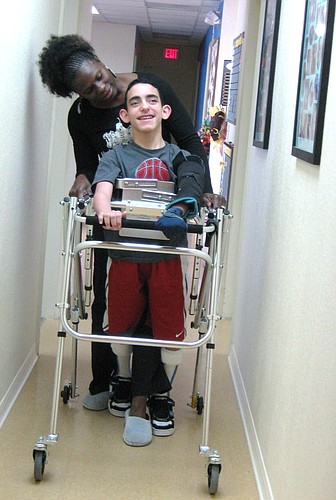- April 15, 2024
-
-
Loading

Loading

In public school, Kody Somers spent five years sitting in a wheelchair.
"He couldn't walk, even with a walker, and he wasn't being challenged," said Kody's mom, Katina.
A school counselor told her about the Conductive Education Center of Orlando on Forsyth Road, just outside of Winter Park, and three years later, 12-year old Kody uses a walker with moderate assistance.
"He loves coming to school and has improved by leaps and bounds," Katina said.
Kody has lissencephaly, a rare gene-linked brain disorder, sometimes called 'smooth brain', where missing brain ridges affect speech and cognition. Through a McKay Scholarship, Katina was able to send Kody to the Conductive Education Center, where staff tried new things with Kody from the beginning.
"He understands much more than he can communicate," Katina said.
Kody is one of the 20 students at the center, where children with motor disabilities such as cerebral palsy are doing more on their own through an innovative program that began 65 years ago in Budapest, Hungary.
The philosophy
Struggles, triumphs and miracles happen every day in the pumpkin-colored building where students from 4-21 years may attend day and after school programs. The Conductive Education Center also hosts a summer camp that attracts kids from other countries.
Nearly a decade ago, center founders Vicky and Joe Raymond sought an alternative learning environment for their son Joseph, who has cerebral palsy. They learned about conductive education that works on the belief that new neural connections could be formed in children with cognitive abilities. Conductive Education Center incorporates social, physical and cognitive disciplines with structured lesson plans, challenging the brain to find alternative paths to perform basic movements such as sitting, standing and walking. Students gain skills, strength and confidence in a group environment. There are five students per class led by a trained conductor for half the day and a special education teacher the other half.
The Raymonds observed a conductive education school in Minnesota and believed they could duplicate it.
"Every parent looks for schools and resources to meet their child's needs," said Vicky, adding that Joseph has learned sounds, colors and how to make choices. "He loves coming to school and his body is always active."
Raymond said that when kids aren't challenged physically, they lose muscle strength, which affects bone formation and development. In a traditional school, special needs students often must wait for someone to interact with them and physical therapy may be limited. At the center, there is constant interaction and every action through the day is exercise, such as washing hands, walking to the bathroom, sitting for lunch, holding a cup with two hands, wiping their mouths or transitioning from a walker or other equipment.
Community support and donations were vital in expanding into the current 5,000-square-foot building. Although the center receives some state funding, it primarily relies on community support to pay salaries and purchase equipment.
Director Jennifer Gase said half of the center's annual budget comes from community support from organizations such as DiPASQUA Enterprises (Subway), Winter Park Construction, Bayer HealthCare Consumer Care and DRZ Asset Management.
Making strides
When 9-year-old Alexandra Rivera arrived at the center, she could not walk and struggled to hold her head up. She had undeveloped motor skills and a weak upper body. After working for months, she shocked her family when she went home for Thanksgiving in 2008 and used her walker for the first time. Conductor Alexandra Gardi, one of the center's three conductive education teachers who trained in Hungary with dual bachelor of arts degrees in conductive and elementary education, is working with Alex on alternative arm and leg movements. Gardi sings with her students and encourages them as they crawl from one side of the room to the wall bars where they pull themselves up, stretch, squat, balance and stand. Recently Alex was able to stand on her knees and take several steps — another milestone.
Gardi believes hard work, belief in the child's abilities and consistency are the keys to their independence.
Founder Joe Raymond agrees.
"Our kids worked so hard … it was very challenging for them. Then they began doing things we had never seen them do, things we had never seen a teacher or therapist try with them. [The center] instilled a can-do attitude in the children and in us."
Golf for education
The 10th Annual Conductive Education Center of Orlando Golf Classic fundraiser will be held at the Interlachen Country Club in Winter Park, on Monday, April 26.
For more information, call 407-673-5137 or visit www.cecfl.org